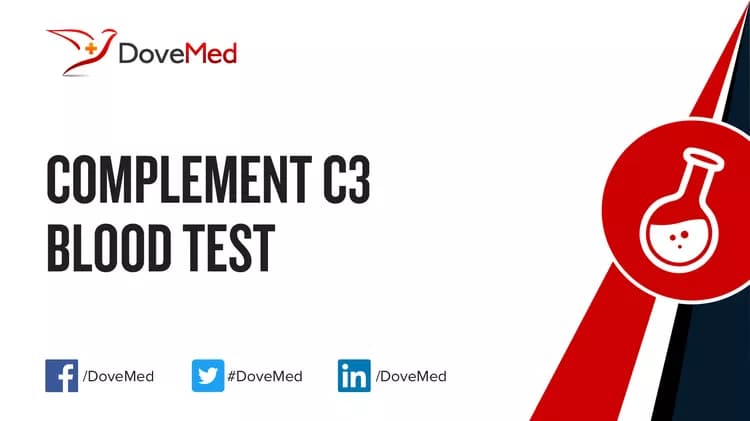What are other Names for this Test? (Equivalent Terms)
- C3 Blood Test
- C3 Component of the Complement System Blood Test
What is Complement C3 Blood Test? (Background Information)
- A complement is an immune cascade made up of the 11 complement proteins C1 to C10 that circulate in the bloodstream. The complement is part of the body’s innate, or nonspecific, immune response
- The innate immune system is present at birth. It defends the body from a wide array of offending agents, and does not distinguish between them. The innate immune system is made up of the following components:
- Barriers, such as the skin and mucous surfaces. They protect the body against the outside conditions
- Phagocytes, such as macrophages, which ingest offending agents
- Surveillance cells, such as natural killers, which patrol for abnormal cells
- Inflammation, orchestrated by mast cells. Mast cells release chemicals that help ‘isolate of’ an area of damage and initiate repair processes
- Fever, which elevates body temperature to speed metabolism and combat infection
- Complement, formed by the complement proteins C1 through C10. They complement, or assist, antibodies of the adaptive immune system. They also stimulate inflammation and the action of immune cells
- The complement system is most often activated when circulating C1 encounters a cell bound by antibodies. C1 then attaches and acts as an enzyme. It activates other C proteins it encounters, which then activate others
- This cascade of enzymatic activations ends with the formation of the membrane attack complex (MAC). Like its name implies, MAC attacks the membrane of the pathogen and kills it. It does so by forming a pore in the membrane, which destabilizes the entire cell
- C3 is the most abundant of the 11 complement proteins. It is also among the best studied. Levels of C3 are known to increase during inflammation and tissue destruction, and decrease during autoimmune disorders
- The Complement C3 Blood Test helps determine the levels of C3 in blood. It is used to determine if deficiencies in the complement system are contributing to an immune disorder
What are the Clinical Indications for performing the Complement C3 Blood Test?
Following are the clinical indications for performing the Complement C3 Blood Test:
- Frequent and persistent infections
- Chronic inflammation
- Joint pain or stiffness
- Chronic fever
- Fatigue
- Transplant rejection
How is the Specimen Collected for Complement C3 Blood Test?
Following is the specimen collection process for Complement C3 Blood Test:
Sample required: Blood
Process of obtaining blood sample in adults:
- A band is wrapped around the arm, 3-4 inches above the collection site (superficial vein that lies within the elbow pit)
- The site is cleaned with 70% alcohol in an outward spiral, away from the zone of needle insertion
- The needle cap is removed and is held in line with the vein, pulling the skin tight
- With a small and quick thrust, the vein is penetrated using the needle
- The required amount of blood sample is collected by pulling the plunger of the syringe out slowly
- The wrap band is removed, gauze is placed on the collection site, and the needle is removed
- The blood is immediately transferred into the blood container, which has the appropriate preservative/clot activator/anti-coagulant
- The syringe and the needle are disposed into the appropriate “sharp container” for safe and hygienic disposal
Preparation required: No special preparation is needed prior to the test.
What is the Significance of the Complement C3 Blood Test Result?
The significance of the Complement C3 Blood Test result is explained.
- A high value (greater than 45 mg/dL) for the test may indicate:
- Acute rheumatic fever
- Infection
- Cancer
- A low value (less than 15 mg/dL) for the test may indicate:
- Systemic lupus erythematosus (SLE)
- Acute post-streptococcal glomerulonephritis
- Cirrhosis
- Multiple sclerosis
- Anemia
- Bacterial endocarditis
- Glomerulonephritis
- Septicemia
The laboratory test results are NOT to be interpreted as results of a "stand-alone" test. The test results have to be interpreted after correlating with suitable clinical findings and additional supplemental tests/information. Your healthcare providers will explain the meaning of your tests results, based on the overall clinical scenario.
Additional and Relevant Useful Information:
- The complement is responsible for the destruction of red blood cells after mixing of incompatible blood samples
Certain medications that you may be currently taking may influence the outcome of the test. Hence, it is important to inform your healthcare provider of the complete list of medications (including any herbal supplements) you are currently taking. This will help the healthcare provider interpret your test results more accurately and avoid unnecessary chances of a misdiagnosis.
The following DoveMed website links are useful resources for additional information:
https://www.dovemed.com/common-procedures/procedures-laboratory/complement-blood-test/
Please visit our Laboratory Procedures Center for more physician-approved health information:
http://www.dovemed.com/common-procedures/procedures-laboratory/
Related Articles
Test Your Knowledge
Asked by users
Related Centers
Related Specialties
Related Physicians
Related Procedures
Related Resources
Join DoveHubs
and connect with fellow professionals


0 Comments
Please log in to post a comment.